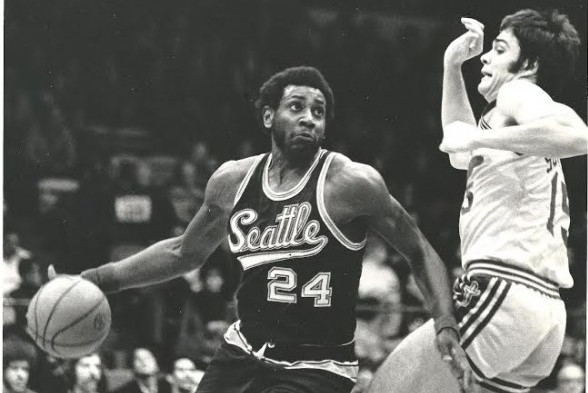
By David Eskenazi and Steve Rudman
It is impossible to say exactly why Spencer Haywood hasn’t sailed into the Pro Basketball Hall of Fame long before now. The Springfield, MA., gallery has a non-transparent selection process, one of the most secretive in American sports, in which neither the voters nor the vote totals are revealed. Haywood’s exclusion could be the result of many factors, but house politics are likely a contributing factor.
Haywood, a finalist this year, once again failed to make the cut. But at least this rejection didn’t carry nearly the sting that last year’s did. That episode turned out to be one of the more embarrassing in Hall annals, regardless of where blame lies.
Haywood told ESPN during a 2013 interview that someone – he didn’t identify who – from the NBA office contacted him and gave him the good news: He would enter the hall along with, among others, former Sonic Gary Payton. Elated and relieved after waiting so long, Haywood flew to Atlanta, where the inductees were scheduled to be announced during Final Four festivities.
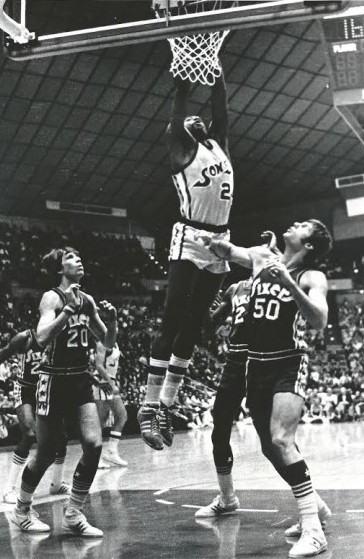
But when Haywood arrived, he discovered he hadn’t been elected after all.
“This isn’t a punch in the stomach,” Haywood told The Las Vegas Review Journal (Haywood makes his home in Las Vegas, where he runs a contracting business). “This is a punch below the stomach.”
The NBA insisted that no operative from the league office would have contacted Haywood about his Hall of Fame status, since the responsibility for doing so belonged exclusively to the Basketball Hall of Fame. Nor did the NBA receive a “heads up” on new members.
So was Haywood the victim of a hoax or cruel trick? Who perpetrated it? Was Haywood simply confused? Did he fabricate the phone call from the NBA official? No one knows. Neither Haywood nor anyone else has been able to clarify what happened.
“I don’t know,” Haywood told ESPN. “I can’t be a private eye, running my mouth or running around, trying to figure out what happened.”
Haywood spent another year waiting to find out whether this would bee the year he assumed his place among the game’s greats. Now it isn’t, and maybe it will never be. If Pro Basketball Reference.com’s “Hall of Fame Probability” ranking is a reliable guide, Haywood’s chances aren’t great, just 51 percent. But many players elected did so with lower probability scores, including K.C. Jones (46 percent), Bernard King (37 percent) and David Thompson (27 percent). Bill Walton entered the Hall in 1993 with a probability score of 16 percent, a reflection of the numerous injuries that compromised his professional career.
Born April 22, 1949 in Silver City, MS., one of 10 children of cotton pickers, and a cotton picker himself as a youth, Haywood eventually moved to Chicago and, finally, Detroit to live with an uncle, arriving there at 15. Over the next couple of years, Haywood developed into one of the greatest prep stars of his time while playing at Detroit’s Pershing High School.
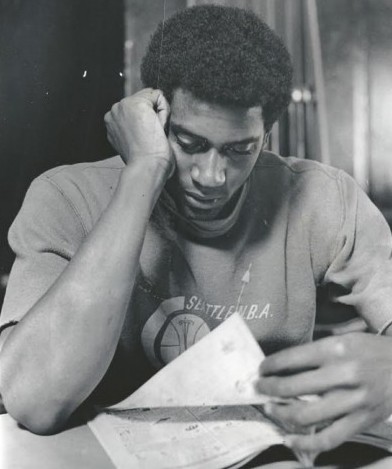
After leading Pershing to the 1967 Class A championship, Haywood spent a year at Trinidad Junior College in Colorado, where he averaged 28.2 points and 22.1 rebounds.
When the major college stars of the era, notably Lew Alcindor (UCLA) and Elvin Hayes (Houston), took the advice of San Jose State sociology professor Dr. Harry Edwards and boycotted the 1968 Mexico City Olympic Games, Haywood, 19 and about to enroll at the University of Detroit, took one of the roster spots at the invitation of U.S. Olympic team coach Hank Iba.
He dominated the Olympic tournament, averaging 16.1 points per game while shooting an absurdly good .719 from the field. Haywood scored a tournament-high 26 points against Italy, 25 against Panama and 21 in the gold-medal game against Yugoslavia.
After returning to the U.S., Haywood averaged 32.1 points and an NCAA-best 21.5 rebounds for the University of Detroit, his spectacular play drawing media interest all around the country. Sports Illustrated carried this observation in its Jan. 6, 1969 issue:
“One month into the season, Haywood is proving to be an even more brilliant catalyst for Detroit than he was for the gold-medal-winning U.S. Olympic team last October. Single-handedly, he is turning a bona fide collection of nobodies into a smooth, winning outfit that now is playing on the edge of college basketball’s Top Ten.
“The Titans made a laugh-in of their own Motor City Tournament, rolling past Mississippi State 86-62 and then beating Temple 87-76. The story was the same each night: everywhere the befuddled visitors turned, there was Haywood blocking their shots, grabbing rebounds out of their hands, gliding through or muscling over them to fill the baskets with points.
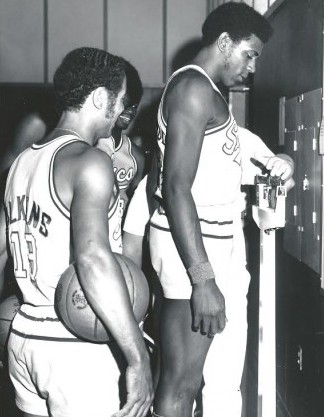
“Haywood got 32 points and 29 rebounds against State, but Temple found him even more awesomely perfect, or perfectly awesome. He made his first 10 shots from the floor to settle matters early, and then ambled out to accept the Outstanding Player Trophy while the stands chanted, “Spencer’s got soul! Spencer’s got soul!”
At the end of his lone season in Detroit, Haywood declared himself ready for professional basketball. But the NBA wasn’t ready for him. The league had a rule stipulating that a young man could not play until four years after his high school class graduated. That left Haywood with two options: Return to college or accept an offer to play in the American Basketball Association, not yet a serious rival to the NBA. Haywood took his prodigious skills to the Denver Rockets.
Haywood tore up the ABA as he had done the collegiate ranks, averaging 30 points and 19.5 rebounds. At 21, Haywood won the league’s Rookie of the Year and Most Valuable Player awards. That’s when things got complicated. Haywood learned that the six-year, $1.6 million contract he signed with Denver wasn’t guaranteed, as he believed it to be.
In those days, the ABA was famous for signing players to contracts that had large “face values,” but not corresponding dollars behind them. When the Rockets refused to bump Haywood’s pay to $3.25 million as compensation to cover the lack of a guarantee, Haywood quit and let it be known he wanted to play in the NBA, even though his high school class had yet to graduate.
Sam Schulman, owner of the Seattle SuperSonics, had his lawyers review Haywood’s contract with the Rockets. They determined it to be invalid. In December 1970, at the NBA owners meetings in Chicago, Schulman asked Commissioner Walter Kennedy for permission to sign Haywood. Kennedy refused.
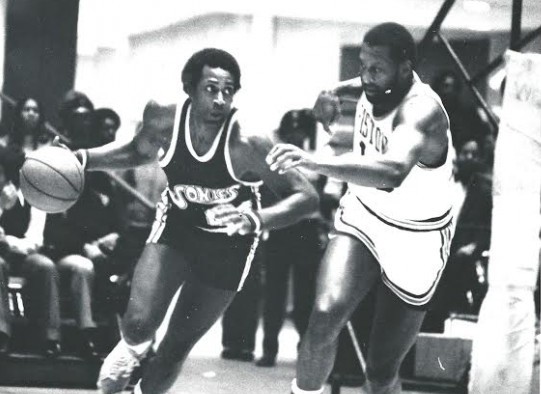
“Kennedy runs a double-standard league,” huffed Schulman. “He takes a hard stand on one hand and turns his head when it suits him. I don’t think he has the ability to administer the league or the ability to lead. He is devoid of leadership.”
On Dec. 30, 1970, after Los Angeles federal judge Warren J. Ferguson ruled that Haywood’s contract with Denver was invalid, Schulman signed the 6-foot-9 Haywood to a multi-year contract – over Kennedy’s objections — that guaranteed Haywood would receive the $1.6 million he was supposed to receive in Denver.
At the same time, Ferguson issued an injunction and temporary restraining order forbidding the NBA from interfering with Haywood’s agreement to play for Seattle.

“We did not sign a player out of college,” Schulman argued. “He is already a professional. We consider his contract with Denver invalid. That makes him a free agent. The graduation clause does not apply in this case.”
Haywood wore a Sonics’ uniform for the first time Dec. 30, 1970 and received a standing ovation from the crowd of 12,935 at the Seattle Coliseum (KeyArena). Although he did not play against the Chicago Bulls that night, the Bulls nevertheless sued the Sonics for $600,000, claiming that Haywood’s addition to the Sonics amounted to a “diminution” of Chicago’s chances of reaching the playoffs.
Seattle player-coach Lenny Wilkens, whose best players included Bob Rule, Dick Synder, Don Kojis, Zaid Abdul-Aziz and Tom Meschery, did not use Haywood until Jan. 4 in a game against Lew Alcindor’s Milwaukee Bucks at Milwaukee’s Civic Arena. Haywood scored 14 points and collected nine rebounds. But his presence on Seattle’s roster caused howls of protest from other clubs.
“Seattle has no right to Haywood,” fumed Celtics coach Red Auerbach.
Haywood faced legal challenges everywhere, often getting slapped with injunctions during warm-ups that prevented him from playing. Public address announcers frequently identified him as “an illegal player.” One night, when the Sonics played at Cincinnati, Haywood was forced to stand outside the arena during a snowstorm because an injunction prevented him from entering the building. Due to the blizzard of court papers he was served, Haywood played in only 33 of Seattle’s 82 games.
After the NBA took Haywood and the Sonics to court, Schulman’s lawyers broadened their complaints against the NBA by adding antitrust allegations involving the college draft and reserve clause to the original attack on the league’s four-year college eligibility rule. Haywood’s lawyers also argued that Haywood, as the sole wage earner in his family, was a “hardship case” and therefore had a right to begin earning his living.
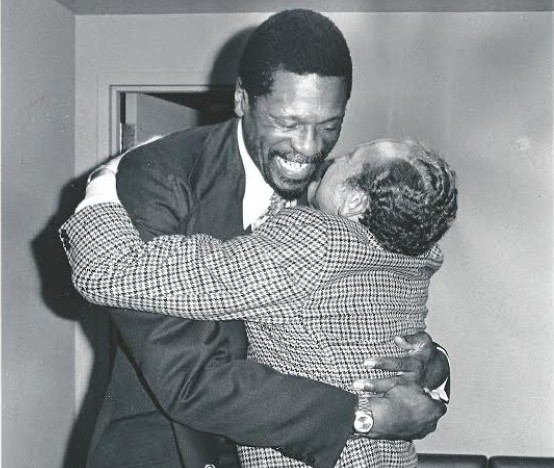
Haywood’s case ultimately reached the U.S. Supreme Court, which ruled March 1, 1971 that the NBA’s reserve clause and its attempts to keep him from earning a living were unconstitutional and that he was entitled to enter the league under the Sherman Antitrust Act. The Supreme Court’s decision in Haywood vs. National Basketball Association opened the doors for underclassmen to enter the NBA Draft. It also placed Haywood in intriguing company.
Curt Flood fought baseball for the right to play where he wanted (he did not want to play in Philadelphia after St. Louis traded him there) and, while he lost a 1972 Supreme Court decision aimed at overturning the reserve clause, his legal battle against baseball led to free agency. Flood won seven consecutive Gold Gloves and hit above .300 six times, but is not in the Hall of Fame.
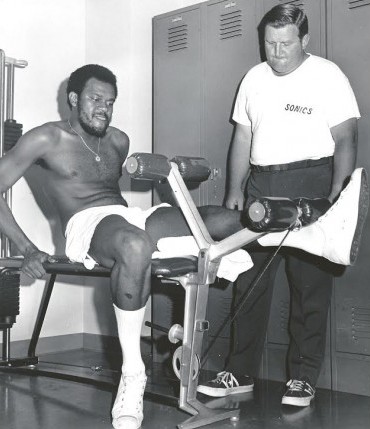
Neither is Marvin Miller, the executive director of the MLBPA who knocked down the remaining obstacles to free agency after Flood plowed the road. Because of Miller, the average salary rose from $19,000 in 1966 to $326,000 in 1982.
Recently retired NBA Commissioner David Stern worked as one of the league’s lawyers who argued the 1970 Supreme Court case against Haywood, who has never publicly blamed Stern for his exclusion from the Hall of Fame, although others have advanced the where-there’s-smoke-there’s-fire argument on Haywood’s behalf. Instead, Haywood has consistently argued his Hall of Fame case on the merits of his play with a healthy ego.
The case for Haywood’s induction into the Hall of Fame comes almost entirely from his brief but spectacular collegiate career, his contributions to the U.S. Olympic team, and the years (1970-75) he spent with the SuperSonics. His notable accomplishments in Seattle:
- Played in five All-Star Games from 1970-75, including the 1974 event in Seattle in which Haywood had 23 points, 11 rebounds, five assists and three blocked shots in a 134-123 West victory.
- Made first-team All-NBA in 1972-73 and second-team All-NBA in 1973-74 and 1974-75.
- Finished fifth in NBA Most Valuable Player voting in 1971-72.
- Averaged 29.2 points per game in 1972-73, a club single-season record, and 13.4 rebounds in 1973-74, also a club single-season record.
- Led the Sonics to their first-ever playoff appearance in 1975 (Sonics lost to Golden State 4-2 in the first round) by averaging 22.4 points and 9.3 rebounds.
- Scored 40 or more points in a game seven times, including a high of 51 against the Kansas City-Omaha (now Sacramento) Kings, Jan. 3, 1973.
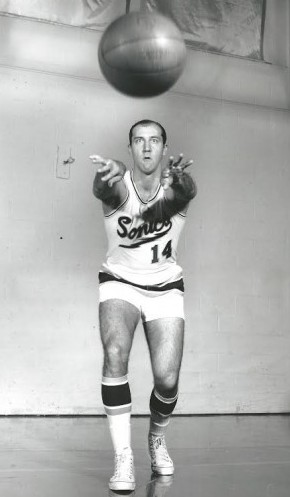
- Scored 20 or more points and grabbed 20 or more rebounds in the same game 16 times.
- Led the Sonics in scoring for four consecutive years (1971-75), one of just two players to accomplish that feat (also Gary Payton).
- Averaged more than 24.0 points per game during his Seattle career, one of two players in franchise history to accomplish that feat (also Ray Allen).
- Between 1971-74, averaged more than 40 minutes per game; averaged 43.4 minutes per game in 1971-72, the most in a single season in franchise history.
- In the 1971-72 season, Haywood’s first full year in Seattle, he averaged 26.2 points and became the first Sonics player named first-team All-NBA. He also became the second rookie to score more than 2,500 points, joining Wilt Chamberlain.
- Named co-winner of the Seattle Post-Intelligencer’s Man of the Year award in 1973.
- Selected as a member of the Sonics’ 40th Anniversary All-Time Team Nov. 5, 2006, along with Ray Allen (2003-06), Fred Brown (1971-84), Dale Ellis (1986-91), Dennis Johnson (1976-80), Shawn Kemp (1989-97), Rashard Lewis (1998-06), Xavier McDaniel (1985-90), Nate McMillan (1987-98), Gary Payton (1990-03), Sam Perkins (1993-98), Detlef Schrempf (1993-99), Jack Sikma (1977-86), Slick Watts (1973-78), Lenny Wilkens (1968-72) and Gus Williams (1977-84).
- Had his jersey No. 24 retired by the Sonics Feb. 26, 2007 in a ceremony at KeyArena.
During a game at the Coliseum March 5, 1972, Haywood slipped on a wet court and suffered a knee injury. Haywood and the Sonics filed claims against the city totaling $441,100. A settlement resulted, but the injury hastened Haywood’s decline as a player even though he continued to put up some monster games.
By 1975, Haywood’s personality conflicts with new coach Bill Russell made him an unhappy player. Russell felt he had no choice but to trade Haywood. The deal went down Oct. 23, 1975, Haywood going to the New York Knicks for $2 million and rookie forward Eugene Short.
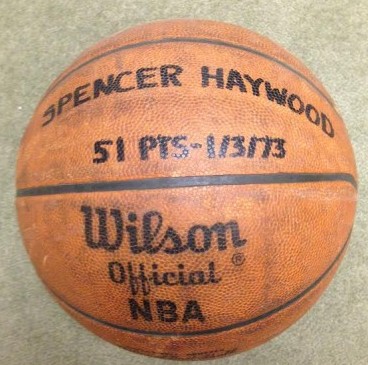
Haywood’s legendary production plummeted upon his arrival in New York and he never made another All-Star team in four seasons with the Knicks, one with the Jazz, another with the Lakers and two with the Bullets (Wizards). His brief stint with the Lakers included the well-publicized nadir of his career: After Haywood fell asleep during a practice during the 1980 NBA Finals, and later admitted to cocaine use, coach Paul Westhead dismissed him from the team.
Haywood played professional basketball for 14 seasons, finishing with 14,445 points (20.3 average) and 8,675 rebounds (10.3). But he performed at a Hall of Fame level only during the six years he spent in Denver (ABA) and Seattle (NBA). His relatively short span of peak production, his willingness to take the NBA to court, and his late-career incidents with the Lakers have not aided Haywood’s Hall of Fame cause. Still, Haywood doesn’t understand why he hasn’t been inducted.
“I’m sure there’s going to be a lot of other reactions from other people and everything else, but I’m personally in a better place spiritually so I accept it,” Haywood told USA Today after he missed again this year. “Hey, I know it’s not right. It is (expletive) up. It is terrible and all those other bad things, but I’ve got to accept it. What is God setting me up for? Something far greater and something bigger, so I accept it.”
————————————
Many of the historic images published on Sportspress Northwest are provided by resident Northwest sports history aficionado David Eskenazi. Check out David’s Wayback Machine Archive. David can be reached at (206) 441-1900, or at seattlesportshistory@gmail.com

8 Comments
Geez, the memories this column brings back…I remember almost all of this as a kid. Thanks, guys.
I first saw Woody when I watched the ABA All-Star Game on TV when he dominated Mel Daniels, who was a hell of a center. Even at age 11, I knew the Sonics were getting a stud. Sure enough. It’s too bad Rule ripped his tendon because a healthy Rule and Woody would’ve been a force inside if they could work together (imagine Lenny with those two down low to feed). Instead, it was guys like Pete Cross and Jim Fox before Russ ran him out in a trade for the immortal Eugene Short.
I’ll stop with that because I could go on, but Spencer Haywood definitely belongs in the Hall. He may have to wait for Springfield’s version of a veteran’s committee, but I can’t imagine he won’t get in someday (I mean, freaking PHIL KNIGHT is in and he’s nothing more than a self-glorified shoe salesman). It just won’t be soon enough.
Woody more than deserves to be in the Hall. It wouldn’t surprise me if someone was pulling his leg on the faux nomination, because those kinds of pranks seem to happen more and more over the years. If he was in the Hall that wouldn’t happen!
If his past history is the reason why he isn’t in the NBA is really, really shallow. Because Woody paved the path for a lot of today’s stars.
I would not be at all surprised if David Stern’s fingerprints are all over Haywood’s exclusion. The man knows how to hold a grudge.
Hard to say. A lot of people were unhappy with Haywood first leaving college early, then jumping his contract with Denver and finally beating the NBA in court to be able to play in Seattle and some of them are still active in the game. The HOF is not run by the NBA, although it obviously has a pretty fair amount of influence, so I wouldn’t say it’s Stern’s doing that Woody isn’t in yet.
Frankly, there are a lot of guys who averaged 20 points in their pro careers who aren’t in the HOF, like Charlie Scott, Marques Johnson, Lou Hudson and George McGinnis. Spencer’s time will come…it just hasn’t come yet.
With forward thinking men as Sam Schulman with his business suave and Spencer
Haywoods presence as a man being mentioned among Flood, Miller and Russell, is a
testament of his greatness as a person, adding to all this his demonstrated
basketball skills that are cited in Daves Eskanzi article just proves
that another injustice similar to baseballs Jim Rice (who finally
made it to the HoF on last chance recently) and should be corrected as
soon as the future present the opportunity, and rightfully so
Great Article….and Rare photos too….Re the caption under the Bob Rule photo…”Bob Rule, with trainer Jack Curran, played with Haywood for two seasons. In 1970-71, Rule averaged 29.8 points, Haywood 20.6.” ….These 2 players didn’t play 2 seasons together…Rule played just the first 4 games before the devastating injury to his achilles….That was the season Haywood played in parts of 33 games post January 4th….The following season ,Haywood’s first full ,official one with Seattle, Rule was unceremoniously shipped off to Philadelphia in November after playing in just 16 games,none as a starter,and not many minutes either….I am of the belief that Haywood PROBABLY belongs in the Hall based on the Olympics, 1969-70 ABA Rookie of the Year and MVP,(30 ppg,20 rpg.), and his infamous entry into the NBA, via a Supreme Court Ruling….I am also have the of the opinion that Haywood,or one of his peeps, “fabricated” the story about the phone call re his induction…He did a similar thing the PRIOR year in February ’12, on local sports talk radio, telling the host that he had been informed he’d be going in ,although ,as he said, “it can’t be announced now, but will be at the Final Four in April”,and then went on to say that he would like Sam Schulman’s widow,Sylvia, introduce him,if her health permitted….This was all in 2012, and LAST year’s bizarre events made me quite leery of whatever comes from Spencer or his camp,if indeed, he has one…Supposedly ,Al Ross, his now retired attorney from back in the day of the ABA jump,was the one who got the call,yet,when contacted by media members, he claimed he only knew about it when Spencer HIMSELF called him……so,— Hmmmm…….there you go……. a pretty good political dirty tricks like strategy,but a risky one that may well have backfired and COULD be what keeps him out altogether…if indeed the Hall/NBA are of the mind that SH manufactured all the drama from last Spring as a way to put public pressure on whomever the secret society members are that elect/appoint/install Hall of Fame members……Spencer Haywood,when he signed with the Sonics in late Dec.1970 was considered and probably was, one of the top 5 basketball players in the world….Having said that,he only played in 4 NBA All Star Games, all as a Sonic, and after ’74 he was nothing special,but actually more of a liability for a team to have on its roster…He flamed out really fast with respect to HOF play…..but once again,factor in the ’68 Olympics heroism in Mexico City,the complete and utter domination of his one ABA year at age 20 or 21,and the landmark United States Supreme Court case that he continually reminds people bears his name,and I would give him my vote (but Jerry Colangelo and David Stern told me NOT to!..lol )……If Spencer plays his cards right, acts all humble and hides his anger, (and hires a P.R. firm) he will probably get in one day……maybe
David Stern! It’s no surprise to see his sorry name pop up here. apparently his vendetta against Seattle goes way way back . . . But yeah, Spencer Haywood. The first big-time pro player any Seattle team ever had. I hope he makes it someday, he meant a lot to the city.
ps note to basketball execs: never trade for a guy named ‘Short.’
I’m looking at the Supreme Court decision here: http://caselaw.lp.findlaw.com/scripts/getcase.pl?court=us&vol=401&invol=1204 and it doesn’t say the draft is unconstitutional. It just overturns an injunction granted by the Court of Appeals. Also, it states the District Court will rule on the legality of the draft. There is no indication of constitutional issues.